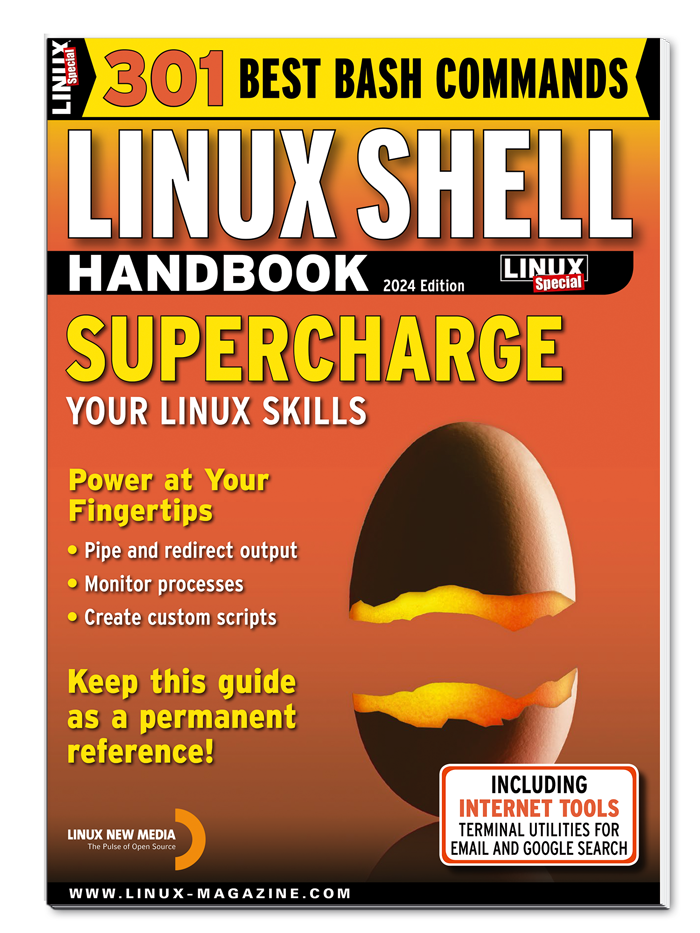Customers in Europe, Switzerland, and the United Kingdom, please click here.

Linux Shell Handbook, Special Edition #50 - Digital Issue
Many users will tell you that exploring the command-line environment is the best way to build a deeper understanding of Linux.
The Linux Shell Handbook is a thorough primer on the Bourne Again Shell (Bash) environment found on most Linux systems. You'll learn to navigate, manipulate text, work with regular expressions, customize your Bash settings, and much more!
IN THIS ISSUE:
We'll show you shell utilities for configuring hardware, setting up users and groups, managing processes, and installing software. We'll even help you get started creating your own Bash scripts to automate recurring tasks. Keep the Linux Shell Handbook beside your computer as a permanent desktop reference on the world of the terminal window.
GETTING AROUND
Introducing Bash
The Bash command shell isn't magic – anyone can learn it. This Linux Shell special edition provides a comprehensive look at the world inside the terminal window.
File Management
We show you how to navigate directories and manage your file resources.
Search Tools
Handy tools like find, locate, and whereis help you chase down files and programs on your system.
Regular Expressions
Regular expressions work with other tools to filter data and help you find the snippet you really need. We show you how to match characters with regular expressions.
Pipes and Redirection
Learn how to direct the output of one command to another command.
Customizing Bash
Get more productive by customizing the command-line environment.
Text Manipulation Tools
Why slow down for a mouse? You can use some simple command-line tools to search, sort, cut, paste, join, and split your text files to zero in on the information you need.
CONFIGURATION
Hardware Configuration
Learn about some tools for configuring and managing hardware on your Linux system.
fdisk, gdisk, and parted
Use these handy disk partitioning utilities to configure your hard drive before you install a new operating system.
Configuring Filesystems
You can't store files without a filesystem. Use these Bash commands for easy filesystem configuration.
mount and fstab
Most Linux distros mount storage media automatically, but someday you might need a classic command-line tool.
Time Tools
These utilities let you set and keep time.
MANAGEMENT
Users, Groups, and Permissions
The shell comes with some simple commands for managing users and granting access to system resources.
su and sudo
Why log in to the root account if you can avoid it?
systemd
Systemd has become the standard for starting, stopping, and managing services in Linux.
Managing Processes
Monitor and manage the processes running on your system.
Package Management Tools
Linux package tools help you install and manage software. We show you some package tools in Debian and RPM-based systems.
dd and mkisofs/genisoimage/xorrisofs
Create backups and bootable CDs with these handy disk utilities.
COMMUNICATION
Networking Tools
We show you some Bash utilities for configuring and troubleshooting networks.
Internet Tools
The Linux environment provides command-line tools for many common Internet tasks, such as checking email, surfing the web, and even searching on Google.
SSH
Manage your server from a distance with this convenient and secure remote access toolkit.
Rsync
Sync your files to stay consistent and avoid data loss.
AUTOMATION
cron and at
Automate and schedule common tasks.
Bash Scripting
We show you how to start writing your own Bash scripts.
Images and PDFs
Use these picture perfect command-line tools to convert and adapt your digital images.